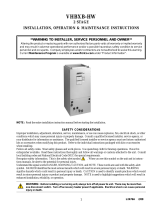
02/12 AHG 020612 2
A. Introduction
Heat Controller Air Handlers come in a variety of
models and sizes for upflow or horizontal use and
when combined with cooling coils, are ready for air
conditioning and heat pump applications.
These instructions are primarily to assist qualified
individuals trained and experienced in the proper
installation of this type of equipment. Refer to
authorities having jurisdiction for additional
guidance.
B. Rules for Safe Installation and Operation
1. Read these rules and the instructions carefully.
Failure to follow the rules and the instructions
could cause a malfunction of the unit, and a
possible safety hazard. Keep these instructions
nearby the unit for future reference.
2. This unit has been designed and manufactured to
comply with National Codes; however, it is the
installer’s responsibility to install this unit to
comply with prevailing codes and regulations.
Heat Controller, Inc assumes no responsibility for
units installed in violation of any code or
regulation.
3. Before servicing, ALWAYS SHUT OFF
ELECTRICITY TO THE UNIT. This will prevent
any electrical shocks.
4. Ground the unit to prevent electric shock. All
electrical wiring should be in accordance with the
National Electrical Code.
5. Duct work must be installed in accordance with
the standards of the National Fire Protection
Association (NFPA) for the installation of Air
Conditioning, Warm Air Heating and Ventilating
Systems (NFPA 90A and 90B). The air
distribution duct system should be sized for 0.2
inches of static pressure. See National
Environmental Systems Contractors Association
Manual K for duct sizing recommendations.
Ductwork in non-conditioned spaces must be
insulated to prevent formation of condensate and
for maximum operating efficiency.
6. The safety testing agency label appearing on the
unit covers the unit and factory installed coil(s)
only. It does not cover any other equipment.
7. Exterior surface of cabinet may sweat when unit is
installed in non-conditioned space such as attic or
garage. Installer must provide protection such as
full size auxiliary drain pan on all units installed in
non-conditioned space such as attic or garage type
installations to prevent damage from condensation.
It is recommended that units installed in non-
conditioned space be insulated on the outside with
1” thick fiberglass with the vapor barrier on the
outside.
8. While designed to operate quietly when properly
installed, several steps should be taken to insure
this. Use of isolation pads when mounting unit,
flexible duct collars for discharge, and use of
acoustical duct liners are all good installation
practices that promote quiet operation.
9. Cabinet insulation is rated for R=4.2 (standard).
Some jurisdictions require R=6.0 on installations
in non-conditioned space. Add insulation 1” thick
to exterior of air handler to comply in these
jurisdictions, putting the vapor barrier on the
outside.
10. Some people are more likely to be permanently
injured by hot water These include the elderly,
children, the infirm, or physically handicapped. If
anyone using hot water in a home fits into one of
these groups, or if there is a local code or statelaw
requiring a certain maximum water temperature at
the hot water tap, then special precautions must be
taken in addition to using the lowest possible
temperature setting that satisfies hot water needs.
Some type of tempering device, such as a mixing
valve, must be used to ensure that people who
might be adversely affected are not subjected to
harmful water temperatures.
C. Unpacking the Unit
The unit should be unpacked on receipt and if damage
is found, a claim should be made immediately to the
shipping carrier. This is the
responsibility of the entity receiving the equipment.
The air handler is completely assembled, as received.
Electric power, thermostat wiring, water piping,
refrigerant piping and duct connections are needed to
complete an installation. Additionally, a drain
connections will be needed.
Check the rating plate for unit size, voltage, phase etc.
to make sure unit meets your requirements.
D. Physical Installation
MINIMUM CLEARANCES
These units have a 0” minimum clearance to
combustible materials rating from all cabinet surfaces.
The unit should be installed with serviceability
clearance of 30” from the front of the unit. The unit can
be serviced entirely from the front, including replacing
the filter. Be sure and route primary and secondary
drain connections so as not to obstruct filter
replacement.
HOT WATER CAN SCALD. WATER HEATED
TO A TEMPERATURE WHICH WILL
SATISFY SPACE HEATING, CLOTHS
WASHING, DISH WASHING AND OTHER
SANITIZING NEEDS CAN SCALD AND
PERMANETLY INJURE A PERSON UPON
CONTACT








